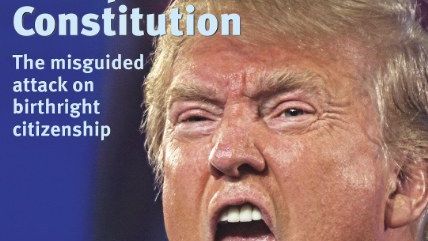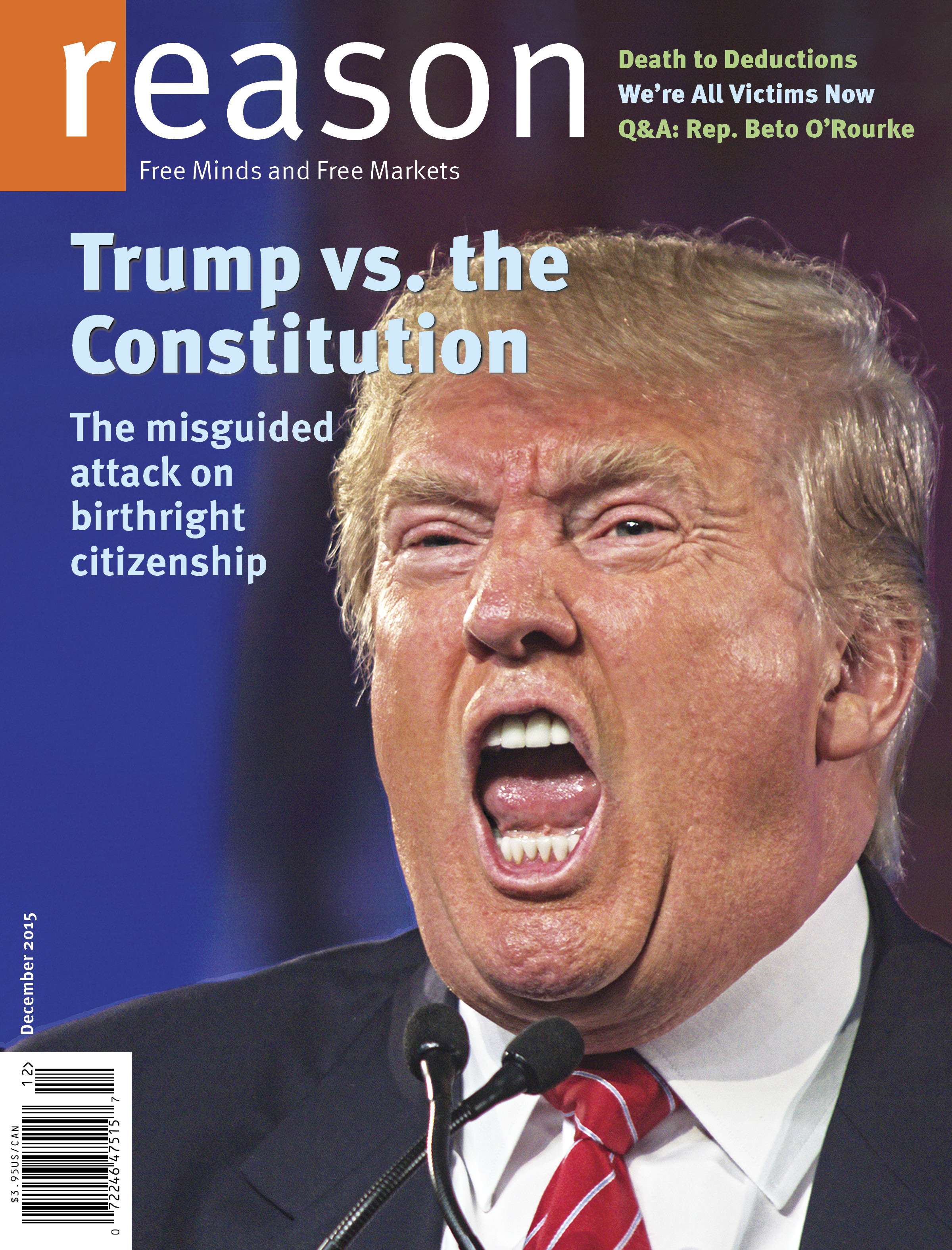If You Support Trump, You May Be an Authoritarian (Also: If You Support Clinton, Rubio, Sanders, Cruz …)
He's hardly alone in wanting to use government force to control others.


Reason has not been shy about pointing out Donald Trump's lack of interest in liberty and freedom in what motivates his so-far-extremely-successful campaign for president (check out Damon Root's cover story from our December issue).
That Trump would appeal to authoritarians should come as no surprise. His campaign is focused solely on results and seemingly has little interest in legal or moral barriers to the process of getting from point A to point B. So when a piece from Politico over the weekend, written by a Matthew MacWilliams, a political science student studying authoritarianism, with the clickbait headline "The One Weird Trait That Predicts Whether You Are A Trump Supporter," started showing up in my social media newsfeeds from friends on both the left and the right, I didn't bat an eye.
For those who didn't see the piece, MacWilliams polled 1,800 registered voters and determined that among those Republicans who were supporting Trump over other candidates, there were only two variables they seem have in common. It wasn't race, wealth, education, or age or typical demographics: It was how strongly authoritarian MacWilliams calculated them to be and how much they feared terrorism. But, MacWilliams said, the authoritarian component was much more important.
But how exactly does somebody determine how authoritarian people are? People don't generally admit to being authoritarian, really. MacWilliams explains the four questions he used to figure it out:
In addition to the typical battery of demographic, horse race, thermometer-scale and policy questions, my poll asked a set of four simple survey questions that political scientists have employed since 1992 to measure inclination toward authoritarianism. These questions pertain to child-rearing: whether it is more important for the voter to have a child who is respectful or independent; obedient or self-reliant; well-behaved or considerate; and well-mannered or curious. Respondents who pick the first option in each of these questions are strongly authoritarian.
Based on these questions, Trump was the only candidate—Republican or Democrat—whose support among authoritarians was statistically significant.
When I read this, my thoughts fell along the line of "Respectful to whom? Obedient to whom? Who is defining 'well-mannered?'" Those questions were only heightened by MacWilliams analysis of where trends of authoritarian attitudes among Americans have gone:
Not all authoritarians are Republicans by any means; in national surveys since 1992, many authoritarians have also self-identified as independents and Democrats. And in the 2008 Democratic primary, the political scientist Marc Hetherington found that authoritarianism mattered more than income, ideology, gender, age and education in predicting whether voters preferred Hillary Clinton over Barack Obama. But Hetherington has also found, based on 14 years of polling, that authoritarians have steadily moved from the Democratic to the Republican Party over time. He hypothesizes that the trend began decades ago, as Democrats embraced civil rights, gay rights, employment protections and other political positions valuing freedom and equality. [Emphasis added] In my poll results, authoritarianism was not a statistically significant factor in the Democratic primary race, at least not so far, but it does appear to be playing an important role on the Republican side. Indeed, 49 percent of likely Republican primary voters I surveyed score in the top quarter of the authoritarian scale—more than twice as many as Democratic voters.
Here's my social science red flag alert. Suddenly we're getting subjective about concepts like obedience and respect. If we were to ask who showed a greater interest in respect and obedience for laws that prohibited discrimination on the basis of sexual orientation, which party would present as more authoritarian?
The problem is that some social scientists don't see authoritarianism in that dimension. We talk about this sort of blindness frequently when we discuss civil rights laws and the fact that proponents are often either unable or disinterested in differentiating between government and private discrimination. Using the law to ban discriminatory practices by private employers or to demand private business do things like make wedding cakes for gay couples is an expression of government authority. This is a separate matter from whether these laws are good or bad, depending on one's values. It is nevertheless an expression of an authoritarian attitude.
So it raises the question of whether authoritarian attitudes have actually moved from the Democratic to the Republican parties over time, or whether the definition of "authoritarian" has been co-opted into the culture wars between the left and the right. Would the ranchers in Oregon who have taken over Malheur National Wildlife Refuge count as "authoritarian" or "anti-authoritarian"? Better yet, why not take this quiz and take a look at how much it bases "authoritarian" attitudes on support of religious cultural conservative values, even though not all questions indicate a desire to use the government to enforce them? Then imagine those you know who would brag about getting a low score on such a test who have also tweeted or posted on Facebook that the authorities should have broken up those protests in Oregon and thrown the lot of them in jail.
I have a hard time believing that a Democratic Party choosing between Hillary Clinton and Bernie Sanders doesn't have heavy authoritarian tendencies. Both candidates are proposing significant amounts of new laws and regulations to control citizen behavior. Because they're doing so out of a sense of social or economic fairness doesn't make it less "authoritarian." Just ask citizens of Venezuela.
MacWilliams is not wrong about Trump's supporters, clearly. But from the perspective of a libertarian with no ties to either party or any of the ideologies motivating the major candidates, I think he (and social science) is underestimating the amount of authoritarian attitudes emanating from the left because of how they perceive the term. Indeed, I would go so far to say Trump's campaign is actually an extension of the inclination to use government force to solve citizens' concerns under both parties. The difference is that they're no longer even pretending it's about something else.


Show Comments (64)